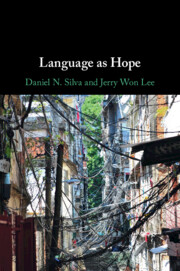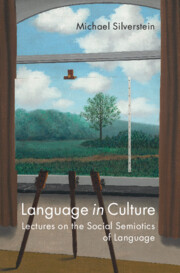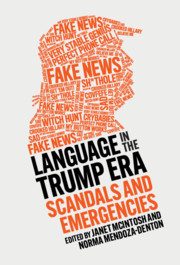Refine search
Actions for selected content:
33 results
3 - Linguistic and Narrative-Based Foundations
- from Part I - Theoretical Foundations
-
-
- Book:
- The Cambridge Handbook of Psychological Anthropology
- Published online:
- 22 October 2025
- Print publication:
- 25 September 2025, pp 62-89
-
- Chapter
- Export citation
2 - Constructing Languages, Constructing Social Life
- from Part I - Theoretical Background and Setting
-
- Book:
- Liquid Languages
- Published online:
- 28 July 2025
- Print publication:
- 14 August 2025, pp 15-37
-
- Chapter
- Export citation
5 - The Language of Violence
-
- Book:
- Love and Violence in Sierra Leone
- Published online:
- 28 January 2025
- Print publication:
- 23 January 2025, pp 93-111
-
- Chapter
-
- You have access
- Open access
- HTML
- Export citation
3 - Loving and Living Relationships in Freetown Today
-
- Book:
- Love and Violence in Sierra Leone
- Published online:
- 28 January 2025
- Print publication:
- 23 January 2025, pp 59-75
-
- Chapter
-
- You have access
- Open access
- HTML
- Export citation
“It Was Supposed to Be an Internship”: The Consequences of Semiotic Ambiguity for Labor and Learning in the New Economy
-
- Journal:
- Signs and Society / Volume 13 / Issue 1 / March 2025
- Published online by Cambridge University Press:
- 22 January 2025, pp. 25-42
-
- Article
-
- You have access
- Open access
- HTML
- Export citation
5 - Contextualising the EU’s NEG Prescriptions and Research Design
- from Part I - Analytical Framework
-
- Book:
- Politicising Commodification
- Published online:
- 30 May 2024
- Print publication:
- 06 June 2024, pp 73-92
-
- Chapter
-
- You have access
- Open access
- HTML
- Export citation
Law’s Logistical Media: The Installation of the File System in the Postwar Japanese Prosecutor’s Office
-
- Journal:
- Comparative Studies in Society and History / Volume 66 / Issue 3 / July 2024
- Published online by Cambridge University Press:
- 04 April 2024, pp. 612-642
-
- Article
- Export citation
6 - Conclusion
-
- Book:
- Language as Hope
- Published online:
- 11 January 2024
- Print publication:
- 01 February 2024, pp 153-161
-
- Chapter
-
- You have access
- Open access
- HTML
- Export citation
5 - Scaling Hope
-
- Book:
- Language as Hope
- Published online:
- 11 January 2024
- Print publication:
- 01 February 2024, pp 123-152
-
- Chapter
-
- You have access
- Open access
- HTML
- Export citation
I - Introduction
-
- Book:
- Language as Hope
- Published online:
- 11 January 2024
- Print publication:
- 01 February 2024, pp 1-20
-
- Chapter
-
- You have access
- Open access
- HTML
- Export citation
1 - Language as Hope
-
- Book:
- Language as Hope
- Published online:
- 11 January 2024
- Print publication:
- 01 February 2024, pp 21-47
-
- Chapter
-
- You have access
- Open access
- HTML
- Export citation
3 - Hope in the Present
-
- Book:
- Language as Hope
- Published online:
- 11 January 2024
- Print publication:
- 01 February 2024, pp 79-101
-
- Chapter
-
- You have access
- Open access
- HTML
- Export citation
2 - “País do Futuro” and Present-Day Communities of Hope
-
- Book:
- Language as Hope
- Published online:
- 11 January 2024
- Print publication:
- 01 February 2024, pp 48-78
-
- Chapter
-
- You have access
- Open access
- HTML
- Export citation
4 - The Enregisterment of Hope
-
- Book:
- Language as Hope
- Published online:
- 11 January 2024
- Print publication:
- 01 February 2024, pp 102-122
-
- Chapter
-
- You have access
- Open access
- HTML
- Export citation

Language as Hope
-
- Published online:
- 11 January 2024
- Print publication:
- 01 February 2024
-
- Book
-
- You have access
- Open access
- Export citation

Language in Culture
- Lectures on the Social Semiotics of Language
-
- Published online:
- 22 December 2022
- Print publication:
- 22 December 2022
-
- Textbook
- Export citation
20 - Multimodality and Multilingualism
-
-
- Book:
- Multilingualism and Education
- Published online:
- 02 June 2022
- Print publication:
- 09 June 2022, pp 168-175
-
- Chapter
- Export citation
The semiotics of the deictic field: Reckoning language and experience in East Los Angeles
-
- Journal:
- Journal of Linguistic Geography / Volume 9 / Issue 1 / April 2021
- Published online by Cambridge University Press:
- 22 November 2021, pp. 40-49
-
- Article
- Export citation
17 - Transnationalism, Globalization and Superdiversity
- from Part IV - (Trans)Locations and Intersections
-
-
- Book:
- The Cambridge Handbook of Discourse Studies
- Published online:
- 28 September 2020
- Print publication:
- 15 October 2020, pp 377-393
-
- Chapter
- Export citation

Language in the Trump Era
- Scandals and Emergencies
-
- Published online:
- 18 September 2020
- Print publication:
- 03 September 2020
